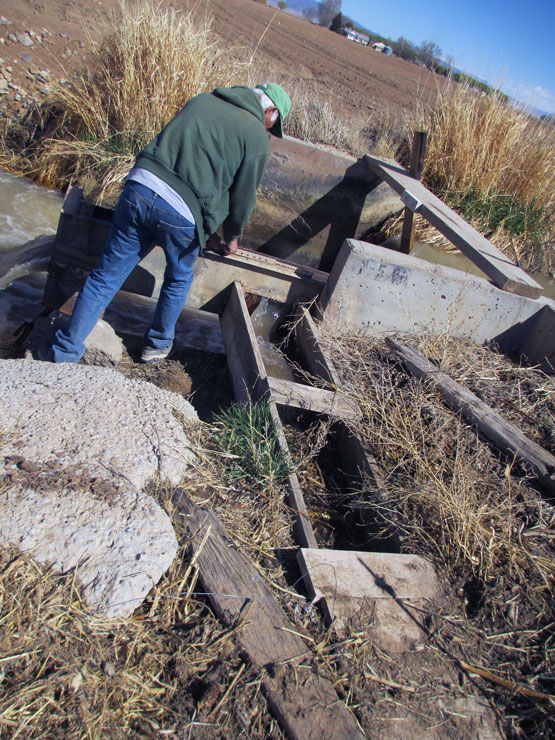After Terry marked out (put furrows) the cornfields, and the alfalfa fields
He made all the earth ditches, which carry the water onto the fields
Then he went back to the bottom each and every field to make the shallow waste ditch….this is the ditch, which catches the water, then moves the water to the next field or to the canal.
Then it was time for us to start the water onto the land. You are looking at Terry opening the headgate and the water starting into the headgate
The water starts down the cement ditch where the trash is forked out by Terry and me
There is always lots and lots of trash; thanks to the cows (it gets caught in their hooves) and the wind.
There are lots of cement ditches on our place, so lots of forking out of the trash.
I always think how grateful I am for my arm muscles and for the ability to straddle the cement ditch — still, at my age. 🙂
Now we start setting the siphon tubes. (See that pooling of water—not good, we have to go out there and dig the furrow out and dam up the spots where the water broke out.)
There is no wasting of the water. Ever. Please don’t think that. We water several fields all at the same time…water that runs by one field is put on another field, the water that goes to the end of the field goes onto another field.
And we work at it constantly. Water checks every two hours to make sure nothing is happening, which shouldn’t be happening—like trash in the ditch causing the water to spill over the side, or trash in the furrow causing two (or more furrows) to run together, or trash in a tube stopping the water altogether.
To put in dams one must straddle the ditch again.
The over-flow of this dam, tells us we need to start two more tubes.
No waste. Ever!
One last time…one more check before the sighing of the night wind takes over.
Your friend on a western Colorado farm,
Linda















No wast—ever. Things we learn either by doing and continues but at our parents knee
MB
LikeLike
You are so right.
LikeLike
Thanks for sharing all the work it takes to get water from the canal to the fields were it is needed. Thanks, too, for not wasting any — water is a precious resource that is too often taken for granted.
LikeLike
And expensive. We pay for for the water than we do for taxes.
LikeLike
Looks like fun…and life goes on despite Covid.
LikeLike
We enjoy it, but I’m sure lots of people would not call it fun.
LikeLike
Yea ~ water from it’s long journey in the high mountains to your place! You guys are amazing! I know the amount of work you put into it each year, and it is keeping you young! Here’s to another good season!!! May it be bountiful ~
LikeLike
Thank you, Elaine! Moving Forward…alfalfa and corn this year…no pinto beans
LikeLike
You have no choice but to stay in good shape with all that hard work. I love the sound of water too.
LikeLike
Well, the winter of sitting around sewing and not doing much but walking has shown me my weak spots. 🙂
LikeLiked by 1 person
What a huge job taking care of that water and you guys do it so well. Thank goodness you are there to see that things are working properly.
LikeLike
Although, Terry says he is still wondering if he should rent out the farm…I see great joy in him as we move around on the farm. 🙂
LikeLike
Thank you for taking such good care of the land and water. I am a farmer at heart and at 78, I still raise a good size garden and lots of flowers and chickens. My yard is my happy place. I don;t comment often, but read your blog regularly. Love Boomer and Mindy.
LikeLike
It is so nice to see your comment here. I so understand that farmer’s heart. Good for you working on your land, large gardens, chickens and flowers take lots of work, but (you are so right) they bring lots of happiness! Hugs to you, My Friend!
LikeLike
Just…WOW. I had no idea about the complexities of irrigation. Goodness. My grandmother’s farm was only two acres. City folk have no clue how to work the land. You are so close to Mother Earth, tending her fields and the life it supports.
You go, girl! 💪👍👊🤗😎💚
LikeLike
You made me smile BIG!!!
LikeLike
Happy to make you smile, love. 😊😁😎💕
LikeLike
🙂
LikeLiked by 1 person
I bet there is no waste! 👏 well done to you both! It must be so exciting seeing the water flow. Interesting the pooling too .. bet that got fixed in a hurry. You amaze me straddling those ditches! Mind you I can’t believe I clamber up the top of our ladder to prune … 🙂
LikeLike
I know…you just do it and then you think, WOW I can still DO IT!!!
LikeLike